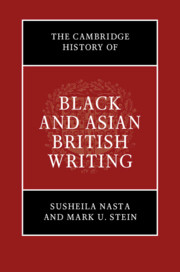Book contents
- The Cambridge History of Black and Asian British Writing
- The Cambridge History of Black and Asian British Writing
- Copyright page
- Dedication
- Contents
- Notes on Contributors
- Preface and Acknowledgements
- Introduction
- Part I New Formations
- Part II Uneven Histories
- (I) Global Locals
- 6 Between the Wars
- 7 Mobile Modernisms
- 8 Establishing Material Platforms in Literary Culture in the 1930s and 1940s
- 9 Transnational Cultural Exchange
- 10 Political Autobiography and Life-Writing
- 11 Staging Early Black and Asian Drama in Britain
- (II) Disappointed Citizens
- (III) Here to Stay
- Part III Writing the Contemporary
- Select Bibliography
- Index
8 - Establishing Material Platforms in Literary Culture in the 1930s and 1940s
from (I) - Global Locals
Published online by Cambridge University Press: 19 December 2019
- The Cambridge History of Black and Asian British Writing
- The Cambridge History of Black and Asian British Writing
- Copyright page
- Dedication
- Contents
- Notes on Contributors
- Preface and Acknowledgements
- Introduction
- Part I New Formations
- Part II Uneven Histories
- (I) Global Locals
- 6 Between the Wars
- 7 Mobile Modernisms
- 8 Establishing Material Platforms in Literary Culture in the 1930s and 1940s
- 9 Transnational Cultural Exchange
- 10 Political Autobiography and Life-Writing
- 11 Staging Early Black and Asian Drama in Britain
- (II) Disappointed Citizens
- (III) Here to Stay
- Part III Writing the Contemporary
- Select Bibliography
- Index
Summary
Many writers publishing in the period prior to WW II were active in setting up and contributing to a number of formative networks. Some were editors, launching new magazines and newsletters, including The Keys (Marson), Indian Writing (Singh, Ali, Subramanian, Shelvankar), or Ceylonese Meary James Tambimuttu’s Poetry London. Poetry London was both crucible for the publication of new poetry and an organ to promote several up and coming visual artists. Other writers, like the Parsi barrister Cornelia Sorabji (India Calling) or public intellectual Mulk Raj Anand, made use of nuanced strategies to profile and represent their voices in the British media. Authoritative informants, translators, and interlocutors, these colonials aired their diverse perspectives in British newspapers, contributing to periodicals such as The Left Review, Life and Letters, or The New Statesman. While there has been little evidence of such contributions in British-published periodical and cultural history, this chapter illustrates the extent and means by which these writers used such platforms to engage with key literary and cultural debates whilst at the same time inscribing new imagined communities.
- Type
- Chapter
- Information
- The Cambridge History of Black and Asian British Writing , pp. 132 - 147Publisher: Cambridge University PressPrint publication year: 2020

